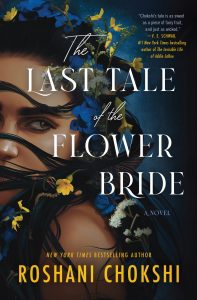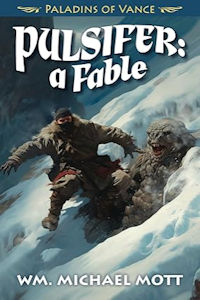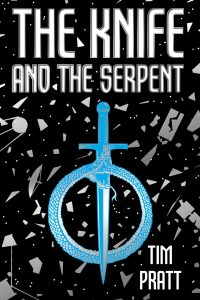Colleen Mondor Reviews The Last Tale of the Flower Bride by Roshani Chokshi
 The Last Tale of the Flower Bride, Roshani Chokshi (Morrow 978-0-06-320650-2, $27.99, hc, 304pp) February 2023. Cover by Elena Masai.
The Last Tale of the Flower Bride, Roshani Chokshi (Morrow 978-0-06-320650-2, $27.99, hc, 304pp) February 2023. Cover by Elena Masai.
Roshani Chokshi has an exceptional ability to write dramatically different but wonderful books. Her Gilded Wolves series, aimed at older teens, is solidly in ‘‘magical James Bond-ian’’ territory (if such a thing exists) and follows a group of misfit gifted teens who break into places that seem impossible to break into, chase bad guys, and upend the social order in an effort to right old wrongs. The Pandava series, aimed at younger readers, involves 12-year old Aru Shah, who unfortunately lights up a magical lamp, thus freeing an ancient demon, and now must find the legendary Pandava brothers, the protagonists of the Hindu epic poem Mahābhārata, in order to save the world. Chokshi’s latest title, The Last Tale of the Flower Bride, is for adults and more in the vein of her Once More Upon a Time in that both are witty and atmospheric retellings that look deeply into all the puzzling aspects that human relationships, romantic and otherwise, can produce. With its heavy gothic atmosphere, dangerous protagonist and lingering sense of uncertainty, The Last Tale of the Flower Bride might be Chokshi’s most beguiling tale yet. It is definitely proof (if we still needed it) that this author is at the top of her game and a literary force deserving of dazzling attention from all the award gatekeepers out there who have thus far missed her thrilling narratives.
Initially, we have an unnamed man, a visiting curator and historian of the Middle Ages, who meets and falls desperately in love with the mysterious heiress Indigo Maxwell Casteñada. For ‘‘the bridegroom,’’ Indigo is irresistible, although he cannot deny that there is a bit, just a bit, about his wife that scares him. For every romantic moment, every kiss and lingering loving glance, there is the stark reminder that he has promised to never ask her about her past. But then Indigo learns that her aunt, the woman who raised her, is dying, and the couple must return to the House of Dreams, the cavernous house where she grew up. In its forbidding and stifling walls, Indigo’s behavior becomes more distant and unforgiving and her aunt, Hippolyta, is downright bizarre. Something happened in this house, he is certain of it, but haunted by his own terrible childhood memories of a lost brother, the bridegroom struggles to discern truth from fantasy. Layer by layer, one lush description after another, Chokshi piles on the possibilities of what might have gone wrong. Can he really think his wife is something monstrous, or maybe she is simply the product of a place that embraces dark corners and engenders paranoia? Maybe it’s all in his head. Maybe.
The bridegroom learns that years ago Indigo’s childhood friend, Azure, disappeared, ran away just as they graduated from high school. No one wants to talk about Azure, but Hippolyta obliquely charges the bridegroom with finding out what happened. One question leads to another, and he senses that Azure might be at the center of whatever secrets Indigo is determined to keep. At that point in the text, Chokshi then takes readers back to a time when the two girls became unlikely friends, with Azure introduced and picking up the past narrative. Indigo was always rich and Azure, living in wretched circumstances with her desperate mother and menacing stepfather, was always needy. They were best friends, but it was an uneven friendship that saw years of troubling moments. Slowly, Azure started to pull away, making Indigo hold on that much more tightly. Then Azure disappeared, and Indigo went on living her best life, falling in love, and demanding complete trust and refusing all questions, no matter what.
So, maybe it’s not all in the bridegroom’s head after all.
The Last Tale of the Flower Bride is a mystery and a thriller and a deep exploration both of the fraught world of teenage girls and the complexity of marriage. In a dense literary forest, this novel shines brightly, it dares you to consider just what secrets you have kept, what hearts you have broken, and what lies in your past that would make you hang your head in shame. For me, it called to mind, just a bit, Pat Murphy’s The Wild Girls, which is also about the complexity of teen girlhood, although more realistic and certainly not as deadly. I felt there were gentle echoes though of Murphy’s protagonists, Joan and Fox, in the story of Azure and Indigo. As both authors know, it can be so hard to be a girl in this world, something that Chokshi shows brilliantly and unforgettably in her latest.
This review and more like it in the May 2023 issue of Locus.
While you are here, please take a moment to support Locus with a one-time or recurring donation. We rely on reader donations to keep the magazine and site going, and would like to keep the site paywall free, but WE NEED YOUR FINANCIAL SUPPORT to continue quality coverage of the science fiction and fantasy field.
©Locus Magazine. Copyrighted material may not be republished without permission of LSFF.







